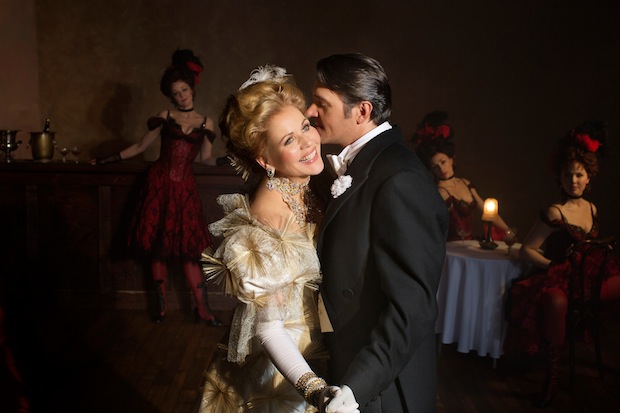The Merry Widow
Met Opera Live
‘Even today, at 75, the waltz from The Merry Widow sends me into a fit of rage,’ wrote Richard Strauss to his close collaborator Clemens Krauss in 1940. In a brilliant piece in his book Essays and Diversions Robin Holloway discusses why that waltz, and indeed the whole of Lehar’s masterpiece infuriated Strauss so much, and mainly concludes that Strauss was jealous of the man who could write the ‘deathless’ tunes of The Merry Widow. Five years before, Strauss had complained ‘to think that one must get to be 70 years old to discover that one’s best gift is for kitsch!’But that only shows that there is kitsch and kitsch.
The worse kind is that which takes itself seriously, claiming to be expressing truths about the Human Condition when it is merely titillating: Rosenkavalier. The innocuous kind, which is what Lehar so winningly offers, is that which knows it is toying with big subjects but doesn’t pretend to do anything else, sending us out of the theatre hopelessly unable to get its melodies and even some of its situations out of our heads for days, but not feeling any requirement to ponder the issues it’s failed to raise.
As might be expected, the Met production makes no attempt to explore the relationship between harsh economic realities and private emotions. The poverty of Pontevedro is a major driving force in the plot, but the only thing that sets the music going is pleasure, desire, love, all heavily coated in glamour, so necessarily ephemeral. The version of the score which Andrew Davis conducts is unusually full, with, for instance, a tiresome extra aria for Hanna which merely lengthens an already slightly too-long piece: presumably to give Renee Fleming yet another chance to show off her vocal charms. I hope that after she retires it will sink back into oblivion.
The music is of an astonishingly sustained level of inspiration, but the same can’t be said of the libretto or of this translation, which furthermore has the kind of illiteracies we only expect from senior politicians and literary journals: ‘A lovely house for you and I’. I don’t think it’s necessary to tie up any loose ends of the plot with such rigour, and it gives some of the performers who have more chances to speak than to sing more chances, too, to ham it up too, some of which were taken by Thomas Allen, though he had his subtler moments.
Opposite Fleming was Nathan Gunn as Danilo, lacking in charm but strong on irony and bitterness. The Valencienne of Kelli O’Hara, from Broadway, lacked vocal allure, but was s brilliant account of the most deeply felt music in the work; and her Camille, Alek Shrader, made an ideal partner. The minor roles were strongly cast, too, and the grisettes and other members of the ensemble were lavish with their charms. A wonderful evening, the only serious cause of complaint being our compere, the gushing, fake Joyce DiDonato, whose imbecilic questions to the cast were suitably answered.






Comments